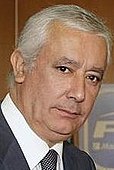| |||||||||||||||||||||||||||||||||||||||||||||||||
All 109 seats in the Parliament of Andalusia 55 seats needed for a majority | |||||||||||||||||||||||||||||||||||||||||||||||||
|---|---|---|---|---|---|---|---|---|---|---|---|---|---|---|---|---|---|---|---|---|---|---|---|---|---|---|---|---|---|---|---|---|---|---|---|---|---|---|---|---|---|---|---|---|---|---|---|---|---|
| Opinion polls | |||||||||||||||||||||||||||||||||||||||||||||||||
| Registered | 6,392,620 | ||||||||||||||||||||||||||||||||||||||||||||||||
| Turnout | 3,885,137 (60.8%) | ||||||||||||||||||||||||||||||||||||||||||||||||
| |||||||||||||||||||||||||||||||||||||||||||||||||
 Constituency results map for the Parliament of Andalusia | |||||||||||||||||||||||||||||||||||||||||||||||||
| |||||||||||||||||||||||||||||||||||||||||||||||||
The 2012 Andalusian regional election was held on Sunday, 25 March 2012, to elect the 9th Parliament of the autonomous community of Andalusia. All 109 seats in the Parliament were up for election. The election was held simultaneously with a regional election in Asturias.
Being a Spanish Socialist Workers' Party (PSOE–A) stronghold for decades, the People's Party (PP) had scored a decisive win in the region in the November 2011 general election and was widely expected to come out on top in the regional election for the first time in its history, with opinion polls suggesting it could win an absolute majority on its own. The election, however, came to be seen as the first major electoral test for the national government of Mariano Rajoy since coming to power in December 2011, with Rajoy's policies of raising taxes and the passing of a new, harsher labour reform having triggered a general strike for 29 March. Incumbent President José Antonio Griñán chose not to hold the election simultaneously with the 2011 general election, the first time since 1994 that both elections were not held at the same time.
Final results showed a surprising close race between the PP and the PSOE–A, the first emerging out on top but falling five seats short of an overall majority. In contrast, the PSOE–A held its own and retained 47 seats despite polls predicting a tougher defeat, allowing Griñán to remain in power through a coalition government with United Left (IULV–CA), which doubled its seat count from 6 to 12 and was placed in a "kingmaker" position.[1]
- ^ Romero, José Antonio (25 March 2012). "La izquierda vence en Andalucía". El País (in Spanish). Madrid. Retrieved 23 January 2022.


